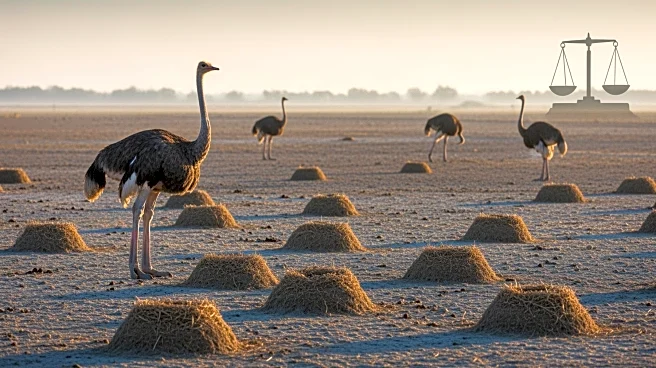What's Happening?
The Canadian Food Inspection Agency (CFIA) has completed the culling of a flu-exposed ostrich herd at Universal Ostrich Farms in British Columbia. This action concludes a legal battle that attracted attention
from U.S. Health Secretary Robert F. Kennedy Jr. The CFIA employed professional marksmen to carry out the culling, citing its 'stamping out' policy to prevent further outbreaks of highly pathogenic avian influenza. The farm's owners had contested the decision, arguing that surviving ostriches could provide valuable antibodies for research, a notion supported by Kennedy. However, the Canadian Supreme Court dismissed the case, allowing the culling to proceed. The CFIA maintains that there was no evidence to support the farm's research claims.
Why It's Important?
The culling of the ostrich herd is significant due to its implications for disease control and the poultry industry. The CFIA's decision underscores the agency's commitment to preventing avian influenza outbreaks, which could severely impact Canada's $7 billion poultry industry. The controversy highlights the tension between public health measures and potential scientific research opportunities. While Kennedy and the farm owners saw potential in studying the ostriches for disease-fighting antibodies, the CFIA prioritized immediate disease control. This case also illustrates the challenges in balancing animal welfare, scientific inquiry, and industry protection.
What's Next?
With the legal case resolved, the CFIA will continue to monitor the situation to prevent further outbreaks. The agency has warned against interference with its operations and illegal drone flights over the farm. The broader implications for the poultry industry remain a concern, as British Columbia reports the highest number of avian flu cases in Canada. The CFIA's actions may prompt discussions on the best practices for managing animal disease outbreaks and the role of scientific research in such scenarios.
Beyond the Headlines
The ethical considerations of culling animals for disease control are complex, involving debates on humane treatment and the potential for scientific research. The case raises questions about the balance between immediate public health needs and long-term scientific benefits. Additionally, the involvement of a high-profile figure like RFK Jr. highlights the intersection of politics and public health policy, potentially influencing future discussions on disease management strategies.









